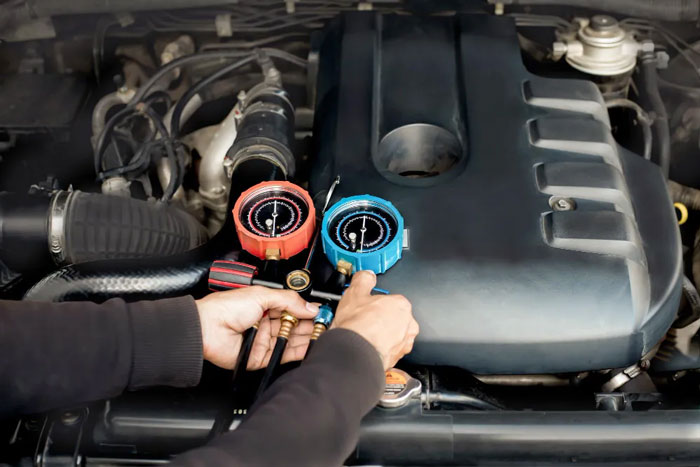So, picture this: it’s a scorching summer day, and you’re counting on your AC to save you from melting into a puddle of sweat. But wait, what’s that strange noise coming from the vents? Could it be your AC compressor acting up? Trust me, dealing with a faulty AC compressor is no walk in the park.
7 Common Symptoms of a Bad AC Compressor
Ah, the joys of a scorching summer day when your AC should be your best friend but decides to throw a tantrum instead. Let’s jump into the intriguing area of AC compressors and their quirky ways. Here are some telltale signs that your AC compressor is up to no good:

Unusual Noise During Operation
When your AC starts sounding like a rock concert in your car or home, it might be your compressor trying out a new gig. Listen for clanking, banging, or squealing noises that shouldn’t be part of the cooling symphony.
Increased Cabin Temperatures
If you’re sweating like you’re in a sauna rather than enjoying a cool breeze, it might not be the summer heat’s fault. A bad compressor can lead to inefficient cooling, leaving you in a hot mess.
Frequent Electrical Issues
Forget disco lights; flickering dashboard lights and electrical problems could mean your compressor is hogging all the power. It’s like that one friend who always drains the battery at a party.
Fluid Leaks from the AC Unit
If you notice mysterious puddles forming under your car or around your AC unit, it’s not a hidden fountain – it’s likely refrigerant leaking from a compromised compressor. Time to fix those tears!
Reduced Airflow from Vents
When your vents decide to whisper instead of shout cool air, your compressor might be nodding off on the job. It’s like expecting a high five and getting a limp handshake.
AC Unit Vibrating on Startup
Is your AC unit doing the electric slide when you turn it on? Excessive vibration could be a sign of compressor trouble. Dance moves belong on the dance floor, not in your HVAC system.
Compressor Clutch Fails to Engage
If your compressor clutch is playing hard to get and doesn’t engage properly, it’s like having a car that refuses to shift out of first gear – frustrating and inefficient. Time for a heart-to-heart with your AC compressor!
Keep an ear out, feel the airflow, and watch for leaks – your AC compressor might just be trying to tell you it needs some TLC.
Conclusion
Well, there you have it, folks! Those sneaky symptoms of a bad AC compressor can really throw a wrench in your summer plans. From weird noises to cabin hot as a sauna, your car’s AC is like a drama queen begging for attention. Remember, keeping an eye out for these red flags can save you from a sweaty situation. So, next time your AC starts acting up, don’t ignore the signs – give it the TLC it deserves. Stay cool, my friends!
Frequently Asked Questions
How can I identify if my AC compressor is malfunctioning?
Look out for warning signs like unusual noises, reduced airflow, hot air from vents, electrical issues, fluid leaks, vibrating on startup, or compressor clutch failure. These symptoms indicate a faulty AC compressor that needs attention.
Is it safe to use my AC when the compressor is faulty?
Running the AC with a bad compressor can lead to inefficient cooling and poor air circulation. Although the fan may still work, it won’t effectively cool your space without a functioning compressor.
What are common causes that damage an AC compressor?
Refrigerant leaks are a major culprit that can harm the compressor. Inadequate refrigerant levels prevent the compressor from functioning properly, leading to potential damage.
What are the consequences of a failing car AC compressor?
Without a working compressor, the AC system won’t cool the cabin adequately. This can result in poor air circulation, potentially causing mold growth from dirt and moisture buildup in the vents.
How do I diagnose a faulty car AC compressor?
Start the engine, turn on the A/C to maximum setting with the fan on high. Check if the compressor is running under the hood. Verify the pressure using an A/C Pro ® gauge to diagnose compressor issues.

